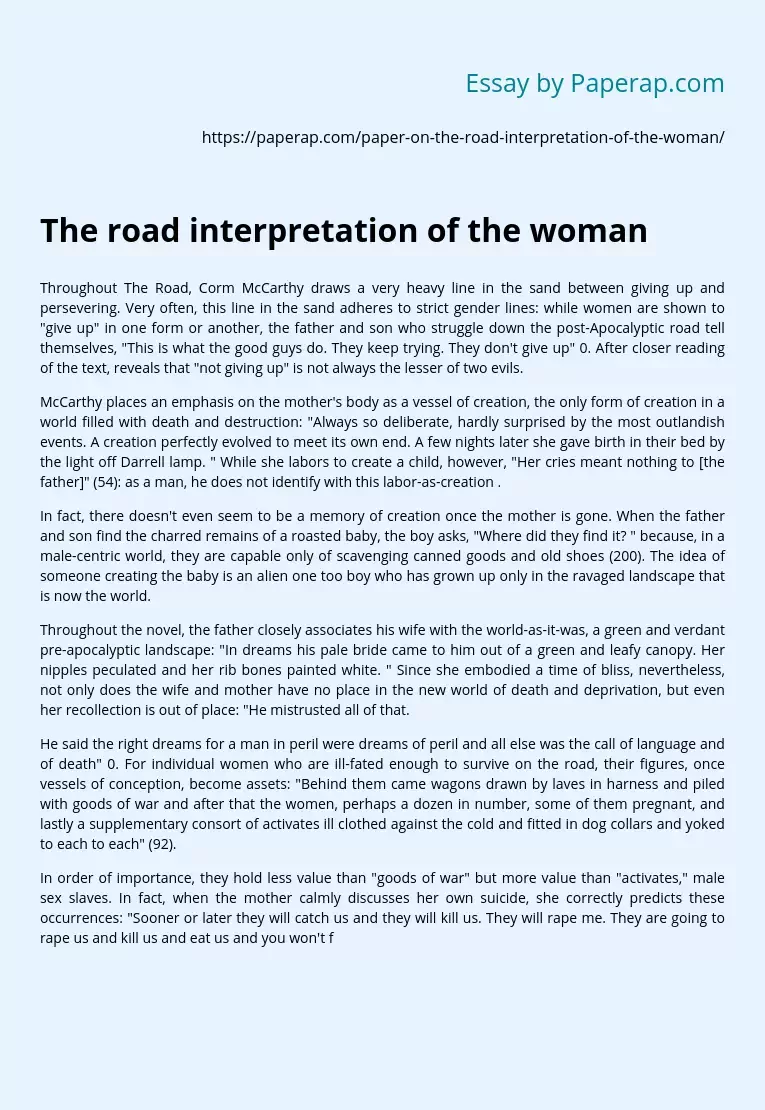Book "The Road" by Corm McCarthy
Throughout The Road, Corm McCarthy draws a very heavy line in the sand between giving up and persevering. Very often, this line in the sand adheres to strict gender lines: while women are shown to “give up” in one form or another, the father and son who struggle down the post-Apocalyptic road tell themselves, “This is what the good guys do. They keep trying. They don’t give up”. After closer reading of the text, reveals that “not giving up” is not always the lesser of two evils.
McCarthy places an emphasis on the mother’s body as a vessel of creation, the only form of creation in a world filled with death and destruction: “Always so deliberate, hardly surprised by the most outlandish events. A creation perfectly evolved to meet its own end. A few nights later she gave birth in their bed by the light off Darrell lamp. ” While she labors to create a child, however, “Her cries meant nothing to [the father]” (54): as a man, he does not identify with this labor-as-creation.
In fact, there doesn’t even seem to be a memory of creation once the mother is gone. When the father and son find the charred remains of a roasted baby, the boy asks, “Where did they find it? ” because, in a male-centric world, they are capable only of scavenging canned goods and old shoes (200). The idea of someone creating the baby is an alien one too boy who has grown up only in the ravaged landscape that is now the world.
Throughout the novel, the father closely associates his wife with the world-as-it-was, a green and verdant pre-apocalyptic landscape: “In dreams his pale bride came to him out of a green and leafy canopy. Her nipples peculated and her rib bones painted white. ” Since she embodied a time of bliss, nevertheless, not only does the wife and mother have no place in the new world of death and deprivation, but even her recollection is out of place: “He mistrusted all of that. He said the right dreams for a man in peril were dreams of peril and all else was the call of language and of death”
For individual women who are ill-fated enough to survive on the road, their figures, once vessels of conception, become assets: “Behind them came wagons drawn by laves in harness and piled with goods of war and after that the women, perhaps a dozen in number, some of them pregnant, and lastly a supplementary consort of activates ill clothed against the cold and fitted in dog collars and yoked to each to each” (92).
In order of importance, they hold less value than “goods of war” but more value than “activates,” male sex slaves. In fact, when the mother calmly discusses her own suicide, she correctly predicts these occurrences: “Sooner or later they will catch us and they will kill us. They will rape me. They are going to rape us and kill us and eat us and you won’t face it” (58).
In some ways, her brutal acceptance of the world-as-it-has-become is much braver than the father’s I’m-sure-everything-will-be-fine-when-we-get-to-the-coast brand of denial. Her willingness to murder her own child to protect him from one of the cruelest worlds in recent literature stands in direct opposition to the father, who, when finally faced with the decision, says, “l cannot hold my son dead in my arms. I she says, “They say that women dream of danger to those in their care and men of anger to themselves. But I don’t dream at all. My heart was ripped out of me the night he was born so don’t ask for sorrow now. There is none” .
Though she brought her child into the world, she knew the world was no place for either her or him, a fact that the father looks back on with some bitterness. Despite the father’s vicious remembering of his wife, however, it is eventually revealed that he feels a certain responsibility for her death: “In his dream she was sick and he cared for her. The dream bore the look of sacrifice but he thought fervently.
He did not take care of her and she died alone somewhere in the dark and there is no other dream nor other waking world and there is no other tale to tell” . In fact, he even goes so far as to say, “He’d come to see a message in each such late history, a message and a warning, and so this tableau of the slain and the devoured did prove to be”. Only a man who feels a certain level of guilt for the way things have turned out could possibly see a “message and a warning” in a setting such as this.
Book "The Road" by Corm McCarthy. (2017, Oct 08). Retrieved from https://paperap.com/paper-on-the-road-interpretation-of-the-woman/

